Evidence-Based Approaches: Critical Skills and Service Improvement
VerifiedAdded on 2022/11/30
|11
|3175
|78
Report
AI Summary
This report provides a detailed analysis of evidence-based approaches in healthcare, emphasizing the importance of integrating research with clinical experience and ethics. It defines evidence-based practice and highlights its benefits for practitioners, patients, and healthcare organizations. The report explores critical research skills like data collection, planning, and critical analysis, alongside qualitative and quantitative research methodologies. It discusses how these methods contribute to service improvements, including the use of critical thinking. The report also includes a literature review on the impact of mental health on well-being, examining factors influencing mental health and its effects on individuals. The findings suggest the significance of addressing mental health concerns for overall well-being.
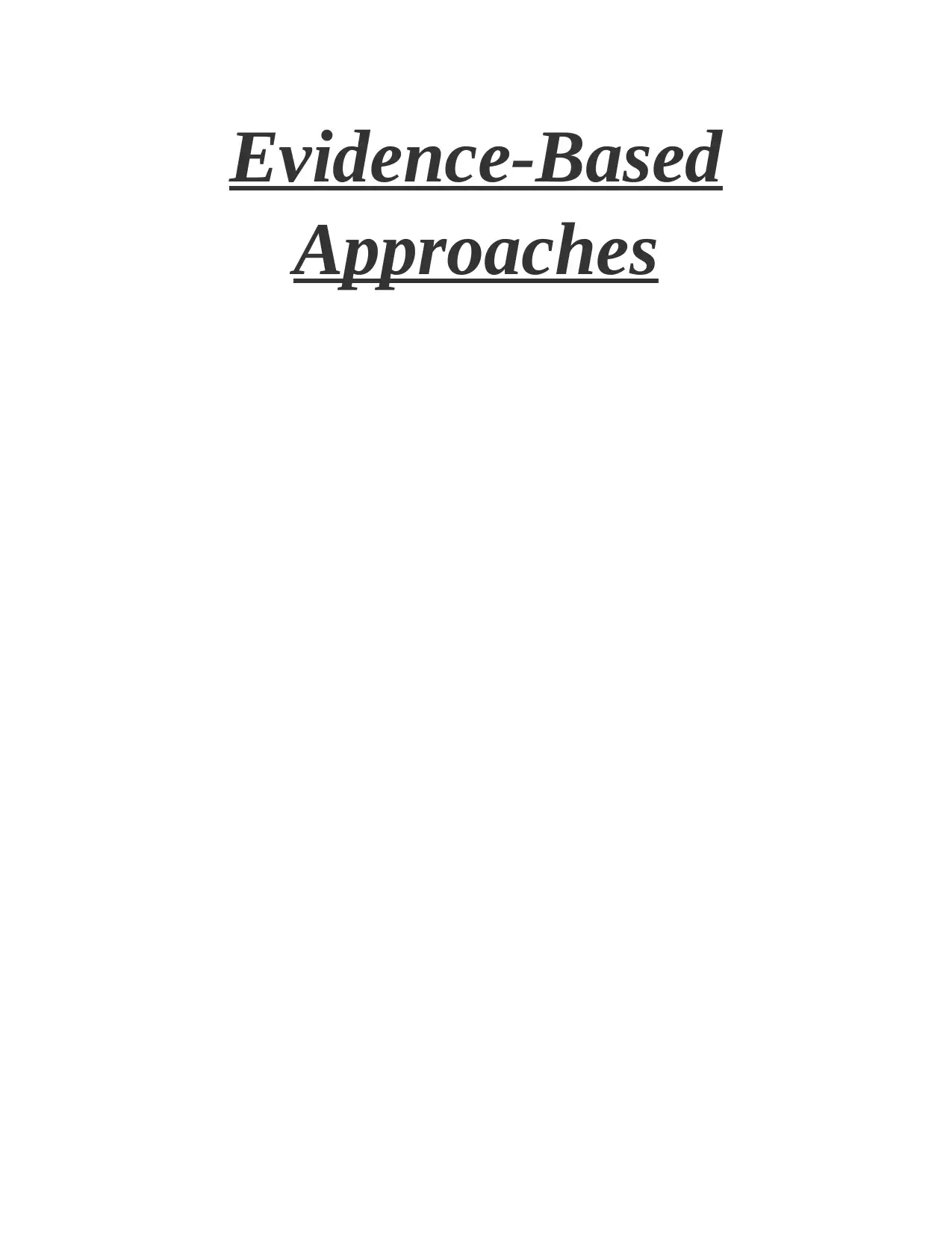
Evidence-Based
Approaches
Approaches
Paraphrase This Document
Need a fresh take? Get an instant paraphrase of this document with our AI Paraphraser
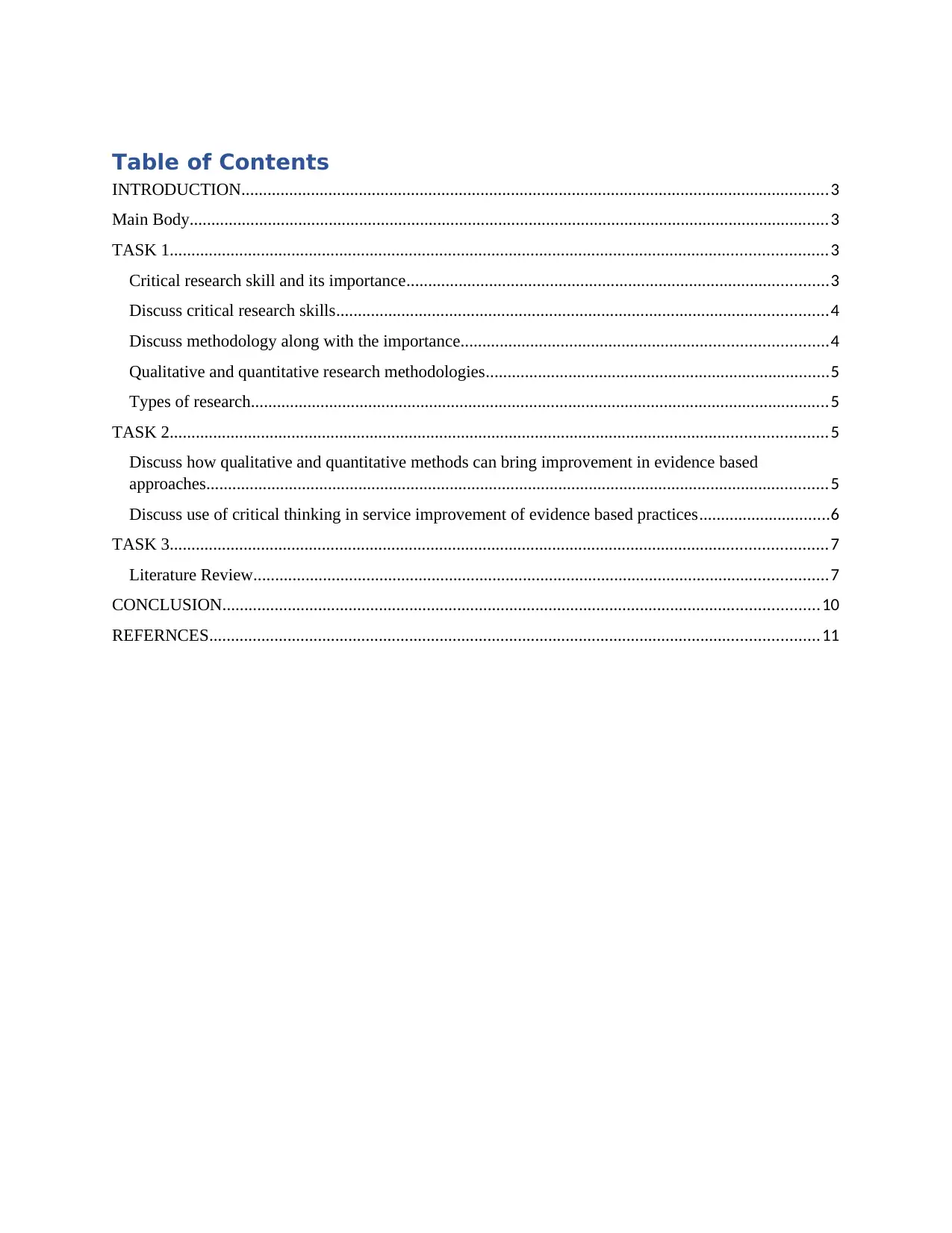
Table of Contents
INTRODUCTION.......................................................................................................................................3
Main Body...................................................................................................................................................3
TASK 1.......................................................................................................................................................3
Critical research skill and its importance.................................................................................................3
Discuss critical research skills.................................................................................................................4
Discuss methodology along with the importance....................................................................................4
Qualitative and quantitative research methodologies...............................................................................5
Types of research.....................................................................................................................................5
TASK 2.......................................................................................................................................................5
Discuss how qualitative and quantitative methods can bring improvement in evidence based
approaches...............................................................................................................................................5
Discuss use of critical thinking in service improvement of evidence based practices..............................6
TASK 3.......................................................................................................................................................7
Literature Review....................................................................................................................................7
CONCLUSION.........................................................................................................................................10
REFERNCES............................................................................................................................................11
INTRODUCTION.......................................................................................................................................3
Main Body...................................................................................................................................................3
TASK 1.......................................................................................................................................................3
Critical research skill and its importance.................................................................................................3
Discuss critical research skills.................................................................................................................4
Discuss methodology along with the importance....................................................................................4
Qualitative and quantitative research methodologies...............................................................................5
Types of research.....................................................................................................................................5
TASK 2.......................................................................................................................................................5
Discuss how qualitative and quantitative methods can bring improvement in evidence based
approaches...............................................................................................................................................5
Discuss use of critical thinking in service improvement of evidence based practices..............................6
TASK 3.......................................................................................................................................................7
Literature Review....................................................................................................................................7
CONCLUSION.........................................................................................................................................10
REFERNCES............................................................................................................................................11
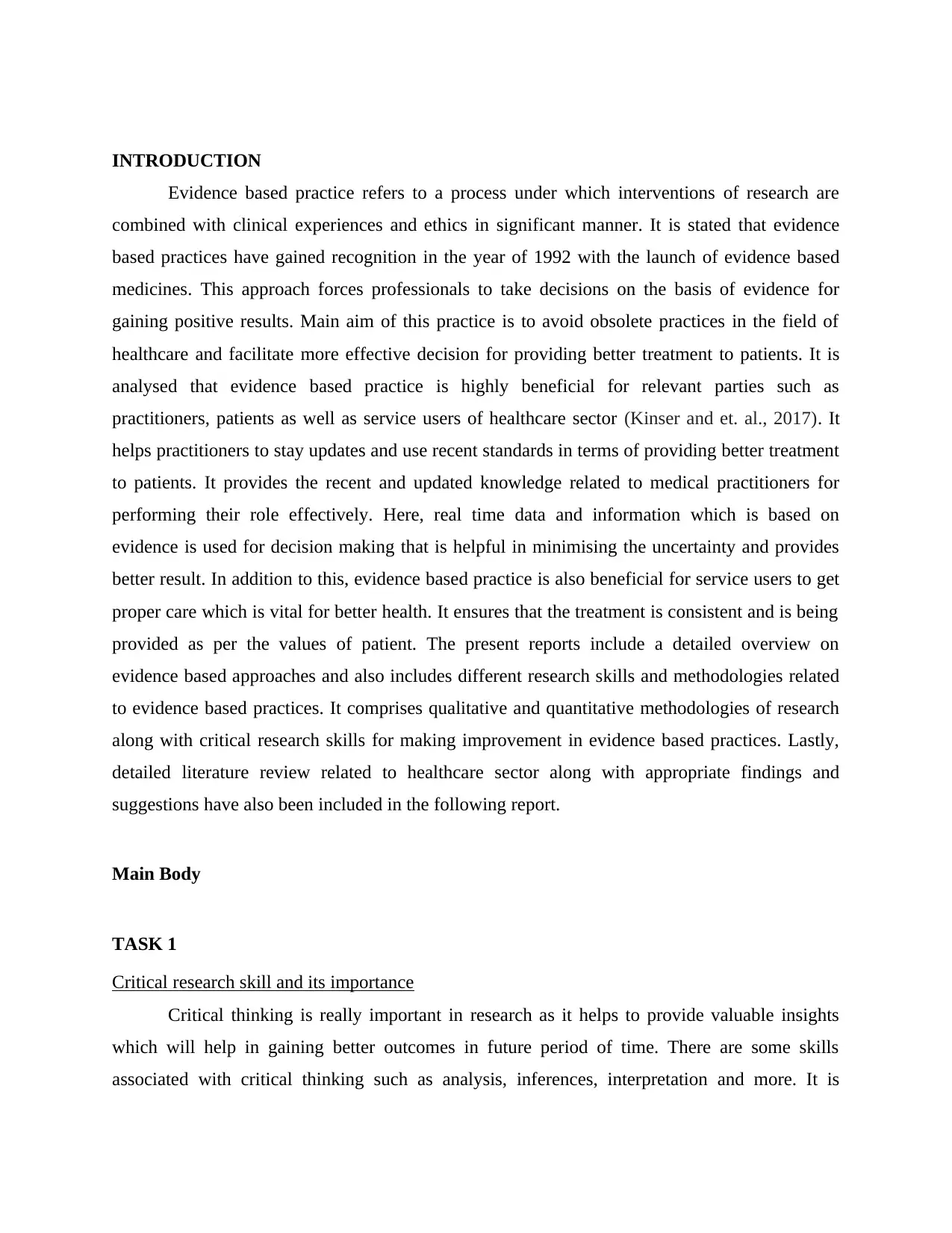
INTRODUCTION
Evidence based practice refers to a process under which interventions of research are
combined with clinical experiences and ethics in significant manner. It is stated that evidence
based practices have gained recognition in the year of 1992 with the launch of evidence based
medicines. This approach forces professionals to take decisions on the basis of evidence for
gaining positive results. Main aim of this practice is to avoid obsolete practices in the field of
healthcare and facilitate more effective decision for providing better treatment to patients. It is
analysed that evidence based practice is highly beneficial for relevant parties such as
practitioners, patients as well as service users of healthcare sector (Kinser and et. al., 2017). It
helps practitioners to stay updates and use recent standards in terms of providing better treatment
to patients. It provides the recent and updated knowledge related to medical practitioners for
performing their role effectively. Here, real time data and information which is based on
evidence is used for decision making that is helpful in minimising the uncertainty and provides
better result. In addition to this, evidence based practice is also beneficial for service users to get
proper care which is vital for better health. It ensures that the treatment is consistent and is being
provided as per the values of patient. The present reports include a detailed overview on
evidence based approaches and also includes different research skills and methodologies related
to evidence based practices. It comprises qualitative and quantitative methodologies of research
along with critical research skills for making improvement in evidence based practices. Lastly,
detailed literature review related to healthcare sector along with appropriate findings and
suggestions have also been included in the following report.
Main Body
TASK 1
Critical research skill and its importance
Critical thinking is really important in research as it helps to provide valuable insights
which will help in gaining better outcomes in future period of time. There are some skills
associated with critical thinking such as analysis, inferences, interpretation and more. It is
Evidence based practice refers to a process under which interventions of research are
combined with clinical experiences and ethics in significant manner. It is stated that evidence
based practices have gained recognition in the year of 1992 with the launch of evidence based
medicines. This approach forces professionals to take decisions on the basis of evidence for
gaining positive results. Main aim of this practice is to avoid obsolete practices in the field of
healthcare and facilitate more effective decision for providing better treatment to patients. It is
analysed that evidence based practice is highly beneficial for relevant parties such as
practitioners, patients as well as service users of healthcare sector (Kinser and et. al., 2017). It
helps practitioners to stay updates and use recent standards in terms of providing better treatment
to patients. It provides the recent and updated knowledge related to medical practitioners for
performing their role effectively. Here, real time data and information which is based on
evidence is used for decision making that is helpful in minimising the uncertainty and provides
better result. In addition to this, evidence based practice is also beneficial for service users to get
proper care which is vital for better health. It ensures that the treatment is consistent and is being
provided as per the values of patient. The present reports include a detailed overview on
evidence based approaches and also includes different research skills and methodologies related
to evidence based practices. It comprises qualitative and quantitative methodologies of research
along with critical research skills for making improvement in evidence based practices. Lastly,
detailed literature review related to healthcare sector along with appropriate findings and
suggestions have also been included in the following report.
Main Body
TASK 1
Critical research skill and its importance
Critical thinking is really important in research as it helps to provide valuable insights
which will help in gaining better outcomes in future period of time. There are some skills
associated with critical thinking such as analysis, inferences, interpretation and more. It is
⊘ This is a preview!⊘
Do you want full access?
Subscribe today to unlock all pages.

Trusted by 1+ million students worldwide
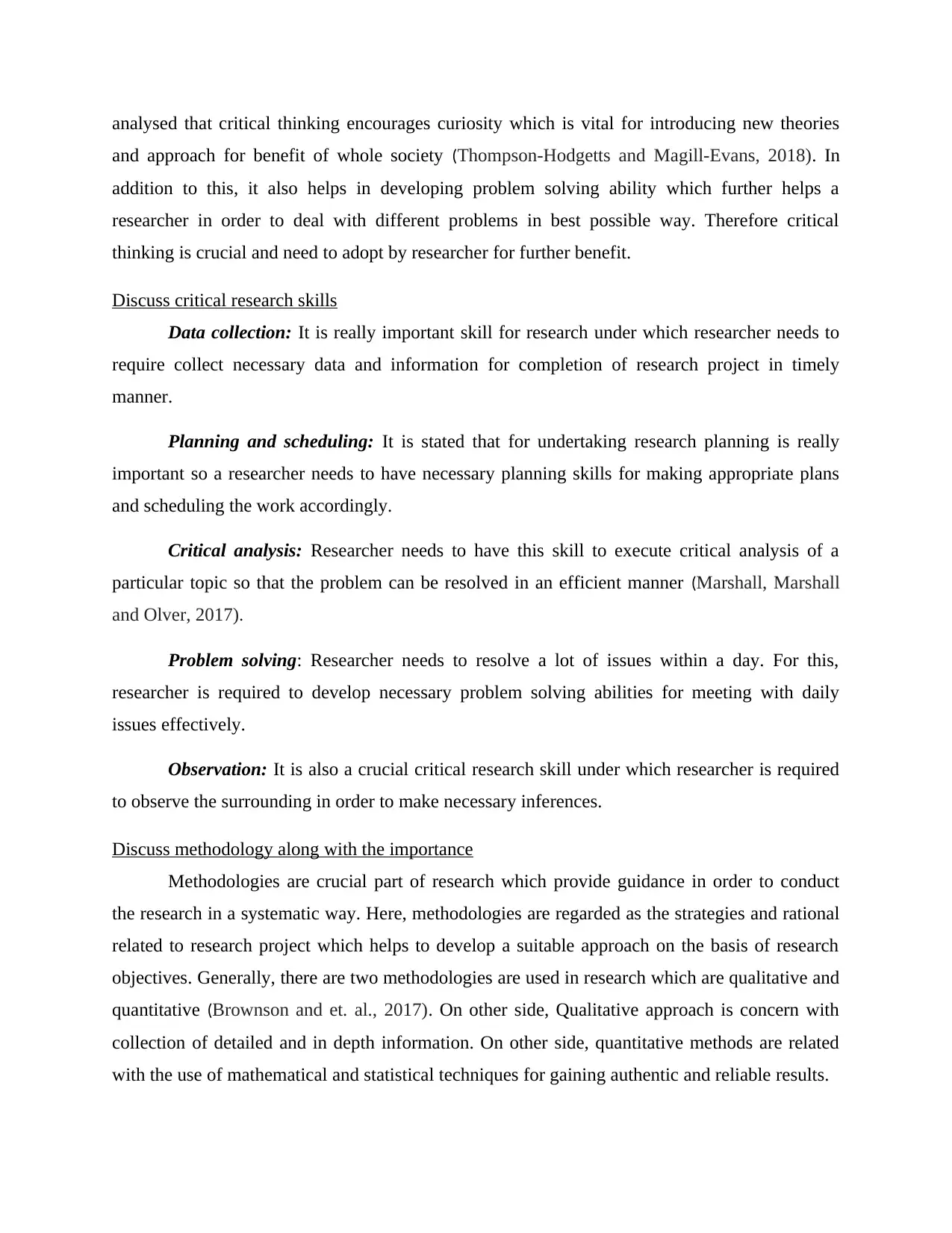
analysed that critical thinking encourages curiosity which is vital for introducing new theories
and approach for benefit of whole society (Thompson-Hodgetts and Magill-Evans, 2018). In
addition to this, it also helps in developing problem solving ability which further helps a
researcher in order to deal with different problems in best possible way. Therefore critical
thinking is crucial and need to adopt by researcher for further benefit.
Discuss critical research skills
Data collection: It is really important skill for research under which researcher needs to
require collect necessary data and information for completion of research project in timely
manner.
Planning and scheduling: It is stated that for undertaking research planning is really
important so a researcher needs to have necessary planning skills for making appropriate plans
and scheduling the work accordingly.
Critical analysis: Researcher needs to have this skill to execute critical analysis of a
particular topic so that the problem can be resolved in an efficient manner (Marshall, Marshall
and Olver, 2017).
Problem solving: Researcher needs to resolve a lot of issues within a day. For this,
researcher is required to develop necessary problem solving abilities for meeting with daily
issues effectively.
Observation: It is also a crucial critical research skill under which researcher is required
to observe the surrounding in order to make necessary inferences.
Discuss methodology along with the importance
Methodologies are crucial part of research which provide guidance in order to conduct
the research in a systematic way. Here, methodologies are regarded as the strategies and rational
related to research project which helps to develop a suitable approach on the basis of research
objectives. Generally, there are two methodologies are used in research which are qualitative and
quantitative (Brownson and et. al., 2017). On other side, Qualitative approach is concern with
collection of detailed and in depth information. On other side, quantitative methods are related
with the use of mathematical and statistical techniques for gaining authentic and reliable results.
and approach for benefit of whole society (Thompson-Hodgetts and Magill-Evans, 2018). In
addition to this, it also helps in developing problem solving ability which further helps a
researcher in order to deal with different problems in best possible way. Therefore critical
thinking is crucial and need to adopt by researcher for further benefit.
Discuss critical research skills
Data collection: It is really important skill for research under which researcher needs to
require collect necessary data and information for completion of research project in timely
manner.
Planning and scheduling: It is stated that for undertaking research planning is really
important so a researcher needs to have necessary planning skills for making appropriate plans
and scheduling the work accordingly.
Critical analysis: Researcher needs to have this skill to execute critical analysis of a
particular topic so that the problem can be resolved in an efficient manner (Marshall, Marshall
and Olver, 2017).
Problem solving: Researcher needs to resolve a lot of issues within a day. For this,
researcher is required to develop necessary problem solving abilities for meeting with daily
issues effectively.
Observation: It is also a crucial critical research skill under which researcher is required
to observe the surrounding in order to make necessary inferences.
Discuss methodology along with the importance
Methodologies are crucial part of research which provide guidance in order to conduct
the research in a systematic way. Here, methodologies are regarded as the strategies and rational
related to research project which helps to develop a suitable approach on the basis of research
objectives. Generally, there are two methodologies are used in research which are qualitative and
quantitative (Brownson and et. al., 2017). On other side, Qualitative approach is concern with
collection of detailed and in depth information. On other side, quantitative methods are related
with the use of mathematical and statistical techniques for gaining authentic and reliable results.
Paraphrase This Document
Need a fresh take? Get an instant paraphrase of this document with our AI Paraphraser
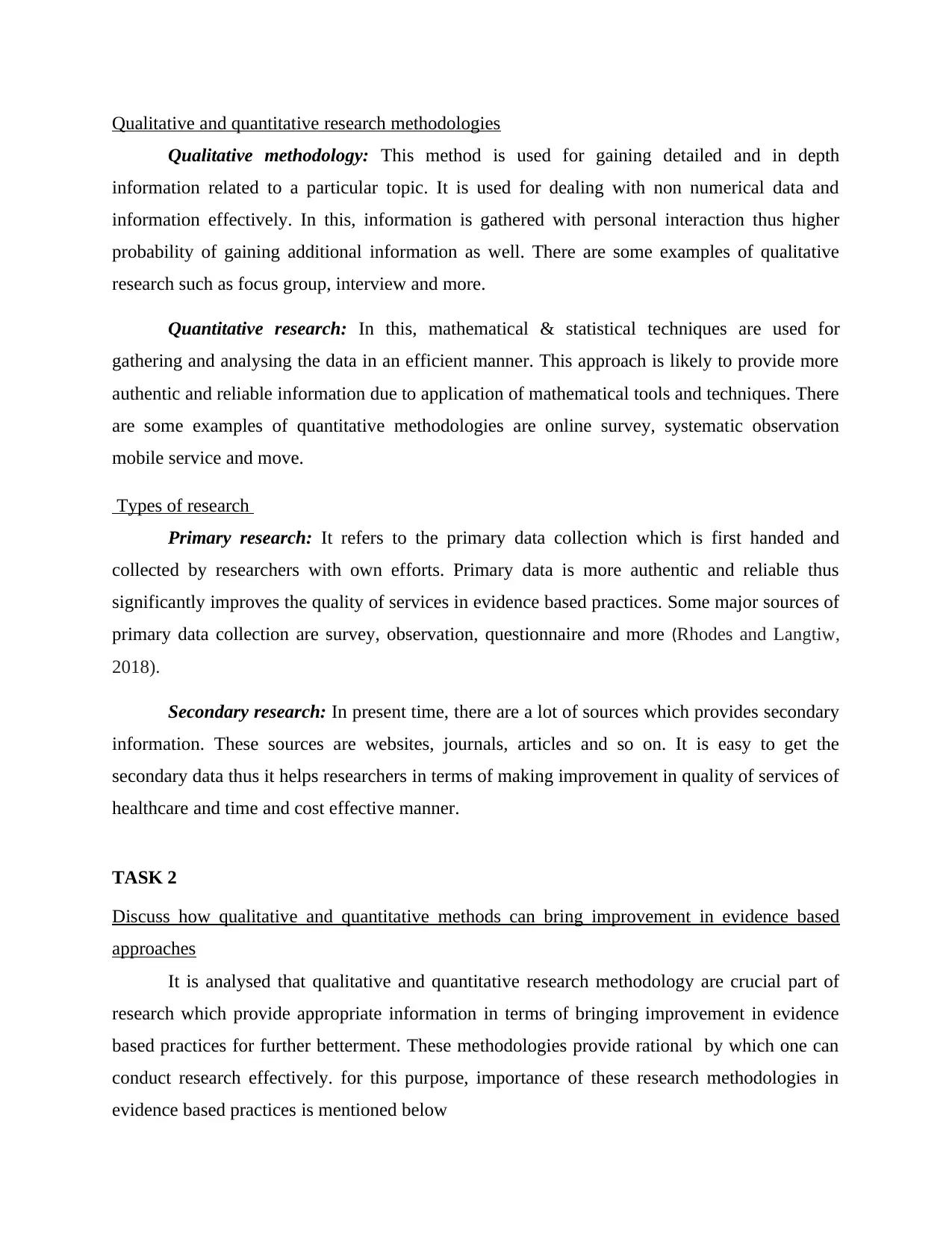
Qualitative and quantitative research methodologies
Qualitative methodology: This method is used for gaining detailed and in depth
information related to a particular topic. It is used for dealing with non numerical data and
information effectively. In this, information is gathered with personal interaction thus higher
probability of gaining additional information as well. There are some examples of qualitative
research such as focus group, interview and more.
Quantitative research: In this, mathematical & statistical techniques are used for
gathering and analysing the data in an efficient manner. This approach is likely to provide more
authentic and reliable information due to application of mathematical tools and techniques. There
are some examples of quantitative methodologies are online survey, systematic observation
mobile service and move.
Types of research
Primary research: It refers to the primary data collection which is first handed and
collected by researchers with own efforts. Primary data is more authentic and reliable thus
significantly improves the quality of services in evidence based practices. Some major sources of
primary data collection are survey, observation, questionnaire and more (Rhodes and Langtiw,
2018).
Secondary research: In present time, there are a lot of sources which provides secondary
information. These sources are websites, journals, articles and so on. It is easy to get the
secondary data thus it helps researchers in terms of making improvement in quality of services of
healthcare and time and cost effective manner.
TASK 2
Discuss how qualitative and quantitative methods can bring improvement in evidence based
approaches
It is analysed that qualitative and quantitative research methodology are crucial part of
research which provide appropriate information in terms of bringing improvement in evidence
based practices for further betterment. These methodologies provide rational by which one can
conduct research effectively. for this purpose, importance of these research methodologies in
evidence based practices is mentioned below
Qualitative methodology: This method is used for gaining detailed and in depth
information related to a particular topic. It is used for dealing with non numerical data and
information effectively. In this, information is gathered with personal interaction thus higher
probability of gaining additional information as well. There are some examples of qualitative
research such as focus group, interview and more.
Quantitative research: In this, mathematical & statistical techniques are used for
gathering and analysing the data in an efficient manner. This approach is likely to provide more
authentic and reliable information due to application of mathematical tools and techniques. There
are some examples of quantitative methodologies are online survey, systematic observation
mobile service and move.
Types of research
Primary research: It refers to the primary data collection which is first handed and
collected by researchers with own efforts. Primary data is more authentic and reliable thus
significantly improves the quality of services in evidence based practices. Some major sources of
primary data collection are survey, observation, questionnaire and more (Rhodes and Langtiw,
2018).
Secondary research: In present time, there are a lot of sources which provides secondary
information. These sources are websites, journals, articles and so on. It is easy to get the
secondary data thus it helps researchers in terms of making improvement in quality of services of
healthcare and time and cost effective manner.
TASK 2
Discuss how qualitative and quantitative methods can bring improvement in evidence based
approaches
It is analysed that qualitative and quantitative research methodology are crucial part of
research which provide appropriate information in terms of bringing improvement in evidence
based practices for further betterment. These methodologies provide rational by which one can
conduct research effectively. for this purpose, importance of these research methodologies in
evidence based practices is mentioned below
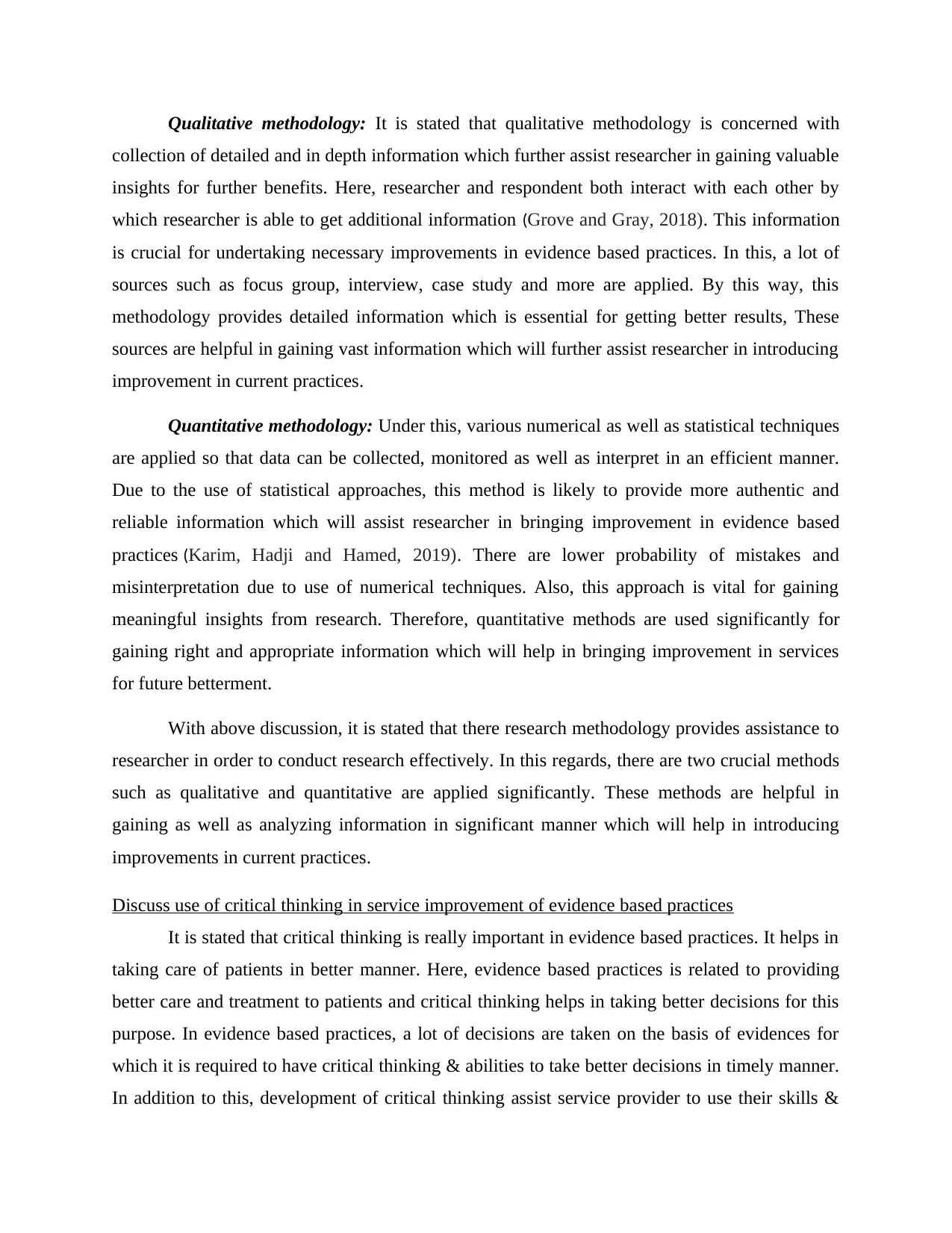
Qualitative methodology: It is stated that qualitative methodology is concerned with
collection of detailed and in depth information which further assist researcher in gaining valuable
insights for further benefits. Here, researcher and respondent both interact with each other by
which researcher is able to get additional information (Grove and Gray, 2018). This information
is crucial for undertaking necessary improvements in evidence based practices. In this, a lot of
sources such as focus group, interview, case study and more are applied. By this way, this
methodology provides detailed information which is essential for getting better results, These
sources are helpful in gaining vast information which will further assist researcher in introducing
improvement in current practices.
Quantitative methodology: Under this, various numerical as well as statistical techniques
are applied so that data can be collected, monitored as well as interpret in an efficient manner.
Due to the use of statistical approaches, this method is likely to provide more authentic and
reliable information which will assist researcher in bringing improvement in evidence based
practices (Karim, Hadji and Hamed, 2019). There are lower probability of mistakes and
misinterpretation due to use of numerical techniques. Also, this approach is vital for gaining
meaningful insights from research. Therefore, quantitative methods are used significantly for
gaining right and appropriate information which will help in bringing improvement in services
for future betterment.
With above discussion, it is stated that there research methodology provides assistance to
researcher in order to conduct research effectively. In this regards, there are two crucial methods
such as qualitative and quantitative are applied significantly. These methods are helpful in
gaining as well as analyzing information in significant manner which will help in introducing
improvements in current practices.
Discuss use of critical thinking in service improvement of evidence based practices
It is stated that critical thinking is really important in evidence based practices. It helps in
taking care of patients in better manner. Here, evidence based practices is related to providing
better care and treatment to patients and critical thinking helps in taking better decisions for this
purpose. In evidence based practices, a lot of decisions are taken on the basis of evidences for
which it is required to have critical thinking & abilities to take better decisions in timely manner.
In addition to this, development of critical thinking assist service provider to use their skills &
collection of detailed and in depth information which further assist researcher in gaining valuable
insights for further benefits. Here, researcher and respondent both interact with each other by
which researcher is able to get additional information (Grove and Gray, 2018). This information
is crucial for undertaking necessary improvements in evidence based practices. In this, a lot of
sources such as focus group, interview, case study and more are applied. By this way, this
methodology provides detailed information which is essential for getting better results, These
sources are helpful in gaining vast information which will further assist researcher in introducing
improvement in current practices.
Quantitative methodology: Under this, various numerical as well as statistical techniques
are applied so that data can be collected, monitored as well as interpret in an efficient manner.
Due to the use of statistical approaches, this method is likely to provide more authentic and
reliable information which will assist researcher in bringing improvement in evidence based
practices (Karim, Hadji and Hamed, 2019). There are lower probability of mistakes and
misinterpretation due to use of numerical techniques. Also, this approach is vital for gaining
meaningful insights from research. Therefore, quantitative methods are used significantly for
gaining right and appropriate information which will help in bringing improvement in services
for future betterment.
With above discussion, it is stated that there research methodology provides assistance to
researcher in order to conduct research effectively. In this regards, there are two crucial methods
such as qualitative and quantitative are applied significantly. These methods are helpful in
gaining as well as analyzing information in significant manner which will help in introducing
improvements in current practices.
Discuss use of critical thinking in service improvement of evidence based practices
It is stated that critical thinking is really important in evidence based practices. It helps in
taking care of patients in better manner. Here, evidence based practices is related to providing
better care and treatment to patients and critical thinking helps in taking better decisions for this
purpose. In evidence based practices, a lot of decisions are taken on the basis of evidences for
which it is required to have critical thinking & abilities to take better decisions in timely manner.
In addition to this, development of critical thinking assist service provider to use their skills &
⊘ This is a preview!⊘
Do you want full access?
Subscribe today to unlock all pages.

Trusted by 1+ million students worldwide
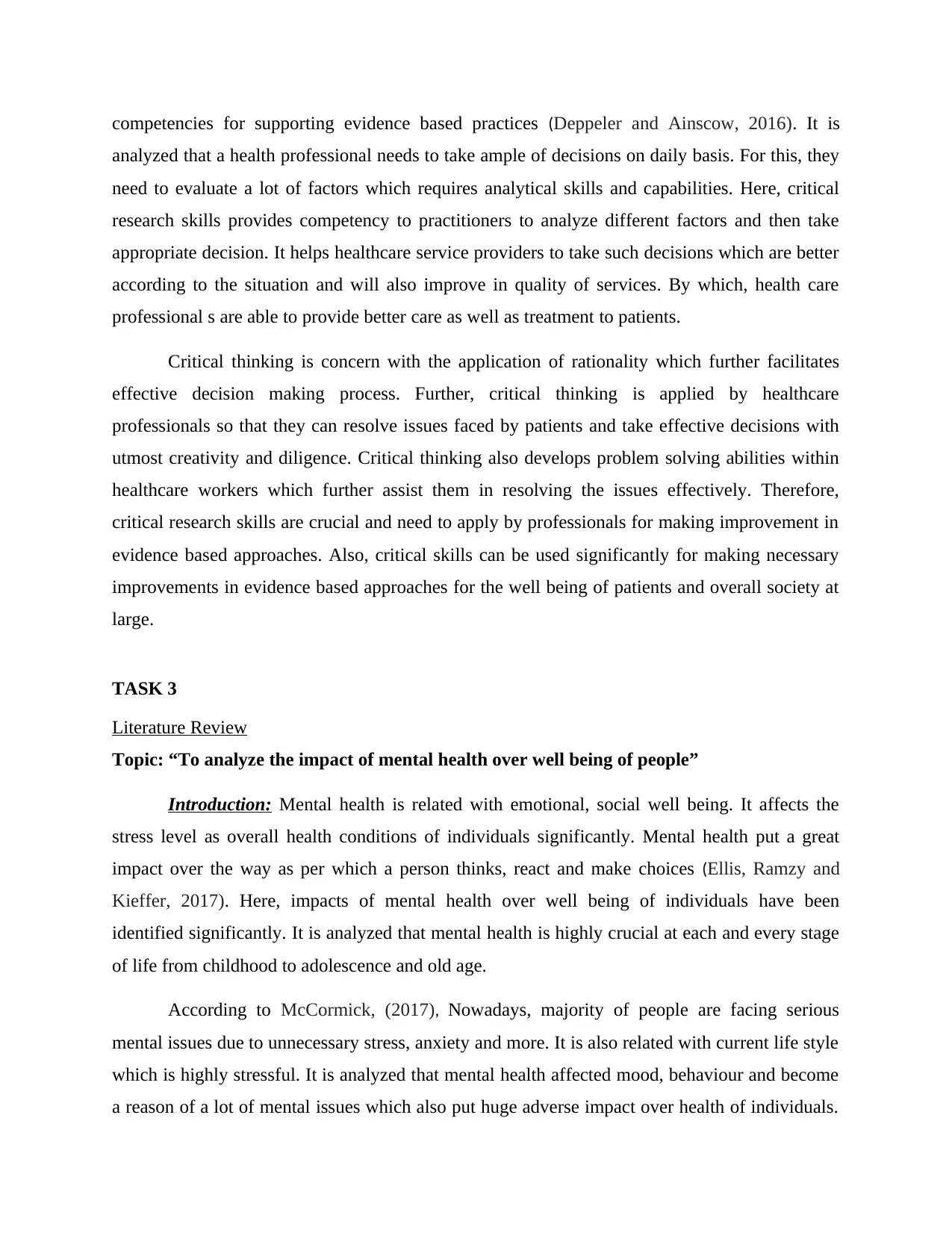
competencies for supporting evidence based practices (Deppeler and Ainscow, 2016). It is
analyzed that a health professional needs to take ample of decisions on daily basis. For this, they
need to evaluate a lot of factors which requires analytical skills and capabilities. Here, critical
research skills provides competency to practitioners to analyze different factors and then take
appropriate decision. It helps healthcare service providers to take such decisions which are better
according to the situation and will also improve in quality of services. By which, health care
professional s are able to provide better care as well as treatment to patients.
Critical thinking is concern with the application of rationality which further facilitates
effective decision making process. Further, critical thinking is applied by healthcare
professionals so that they can resolve issues faced by patients and take effective decisions with
utmost creativity and diligence. Critical thinking also develops problem solving abilities within
healthcare workers which further assist them in resolving the issues effectively. Therefore,
critical research skills are crucial and need to apply by professionals for making improvement in
evidence based approaches. Also, critical skills can be used significantly for making necessary
improvements in evidence based approaches for the well being of patients and overall society at
large.
TASK 3
Literature Review
Topic: “To analyze the impact of mental health over well being of people”
Introduction: Mental health is related with emotional, social well being. It affects the
stress level as overall health conditions of individuals significantly. Mental health put a great
impact over the way as per which a person thinks, react and make choices (Ellis, Ramzy and
Kieffer, 2017). Here, impacts of mental health over well being of individuals have been
identified significantly. It is analyzed that mental health is highly crucial at each and every stage
of life from childhood to adolescence and old age.
According to McCormick, (2017), Nowadays, majority of people are facing serious
mental issues due to unnecessary stress, anxiety and more. It is also related with current life style
which is highly stressful. It is analyzed that mental health affected mood, behaviour and become
a reason of a lot of mental issues which also put huge adverse impact over health of individuals.
analyzed that a health professional needs to take ample of decisions on daily basis. For this, they
need to evaluate a lot of factors which requires analytical skills and capabilities. Here, critical
research skills provides competency to practitioners to analyze different factors and then take
appropriate decision. It helps healthcare service providers to take such decisions which are better
according to the situation and will also improve in quality of services. By which, health care
professional s are able to provide better care as well as treatment to patients.
Critical thinking is concern with the application of rationality which further facilitates
effective decision making process. Further, critical thinking is applied by healthcare
professionals so that they can resolve issues faced by patients and take effective decisions with
utmost creativity and diligence. Critical thinking also develops problem solving abilities within
healthcare workers which further assist them in resolving the issues effectively. Therefore,
critical research skills are crucial and need to apply by professionals for making improvement in
evidence based approaches. Also, critical skills can be used significantly for making necessary
improvements in evidence based approaches for the well being of patients and overall society at
large.
TASK 3
Literature Review
Topic: “To analyze the impact of mental health over well being of people”
Introduction: Mental health is related with emotional, social well being. It affects the
stress level as overall health conditions of individuals significantly. Mental health put a great
impact over the way as per which a person thinks, react and make choices (Ellis, Ramzy and
Kieffer, 2017). Here, impacts of mental health over well being of individuals have been
identified significantly. It is analyzed that mental health is highly crucial at each and every stage
of life from childhood to adolescence and old age.
According to McCormick, (2017), Nowadays, majority of people are facing serious
mental issues due to unnecessary stress, anxiety and more. It is also related with current life style
which is highly stressful. It is analyzed that mental health affected mood, behaviour and become
a reason of a lot of mental issues which also put huge adverse impact over health of individuals.
Paraphrase This Document
Need a fresh take? Get an instant paraphrase of this document with our AI Paraphraser
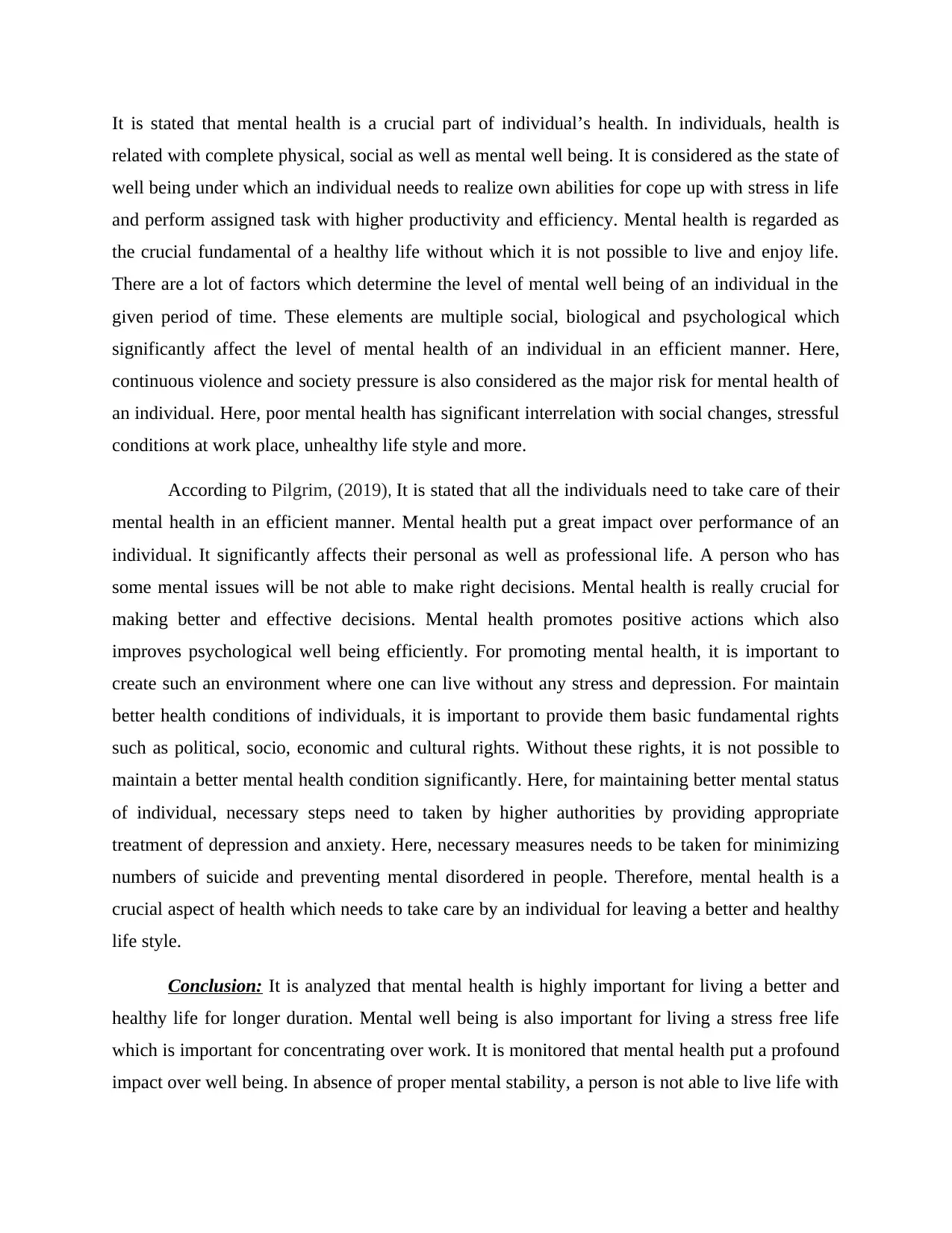
It is stated that mental health is a crucial part of individual’s health. In individuals, health is
related with complete physical, social as well as mental well being. It is considered as the state of
well being under which an individual needs to realize own abilities for cope up with stress in life
and perform assigned task with higher productivity and efficiency. Mental health is regarded as
the crucial fundamental of a healthy life without which it is not possible to live and enjoy life.
There are a lot of factors which determine the level of mental well being of an individual in the
given period of time. These elements are multiple social, biological and psychological which
significantly affect the level of mental health of an individual in an efficient manner. Here,
continuous violence and society pressure is also considered as the major risk for mental health of
an individual. Here, poor mental health has significant interrelation with social changes, stressful
conditions at work place, unhealthy life style and more.
According to Pilgrim, (2019), It is stated that all the individuals need to take care of their
mental health in an efficient manner. Mental health put a great impact over performance of an
individual. It significantly affects their personal as well as professional life. A person who has
some mental issues will be not able to make right decisions. Mental health is really crucial for
making better and effective decisions. Mental health promotes positive actions which also
improves psychological well being efficiently. For promoting mental health, it is important to
create such an environment where one can live without any stress and depression. For maintain
better health conditions of individuals, it is important to provide them basic fundamental rights
such as political, socio, economic and cultural rights. Without these rights, it is not possible to
maintain a better mental health condition significantly. Here, for maintaining better mental status
of individual, necessary steps need to taken by higher authorities by providing appropriate
treatment of depression and anxiety. Here, necessary measures needs to be taken for minimizing
numbers of suicide and preventing mental disordered in people. Therefore, mental health is a
crucial aspect of health which needs to take care by an individual for leaving a better and healthy
life style.
Conclusion: It is analyzed that mental health is highly important for living a better and
healthy life for longer duration. Mental well being is also important for living a stress free life
which is important for concentrating over work. It is monitored that mental health put a profound
impact over well being. In absence of proper mental stability, a person is not able to live life with
related with complete physical, social as well as mental well being. It is considered as the state of
well being under which an individual needs to realize own abilities for cope up with stress in life
and perform assigned task with higher productivity and efficiency. Mental health is regarded as
the crucial fundamental of a healthy life without which it is not possible to live and enjoy life.
There are a lot of factors which determine the level of mental well being of an individual in the
given period of time. These elements are multiple social, biological and psychological which
significantly affect the level of mental health of an individual in an efficient manner. Here,
continuous violence and society pressure is also considered as the major risk for mental health of
an individual. Here, poor mental health has significant interrelation with social changes, stressful
conditions at work place, unhealthy life style and more.
According to Pilgrim, (2019), It is stated that all the individuals need to take care of their
mental health in an efficient manner. Mental health put a great impact over performance of an
individual. It significantly affects their personal as well as professional life. A person who has
some mental issues will be not able to make right decisions. Mental health is really crucial for
making better and effective decisions. Mental health promotes positive actions which also
improves psychological well being efficiently. For promoting mental health, it is important to
create such an environment where one can live without any stress and depression. For maintain
better health conditions of individuals, it is important to provide them basic fundamental rights
such as political, socio, economic and cultural rights. Without these rights, it is not possible to
maintain a better mental health condition significantly. Here, for maintaining better mental status
of individual, necessary steps need to taken by higher authorities by providing appropriate
treatment of depression and anxiety. Here, necessary measures needs to be taken for minimizing
numbers of suicide and preventing mental disordered in people. Therefore, mental health is a
crucial aspect of health which needs to take care by an individual for leaving a better and healthy
life style.
Conclusion: It is analyzed that mental health is highly important for living a better and
healthy life for longer duration. Mental well being is also important for living a stress free life
which is important for concentrating over work. It is monitored that mental health put a profound
impact over well being. In absence of proper mental stability, a person is not able to live life with

peace and calm. For this purpose, it is important to take care of mental well being and take
appropriate treatment while facing any kind of mental issue. It is stated that mental health is
highly significant and valuable for living a healthy lifestyle.
appropriate treatment while facing any kind of mental issue. It is stated that mental health is
highly significant and valuable for living a healthy lifestyle.
⊘ This is a preview!⊘
Do you want full access?
Subscribe today to unlock all pages.

Trusted by 1+ million students worldwide
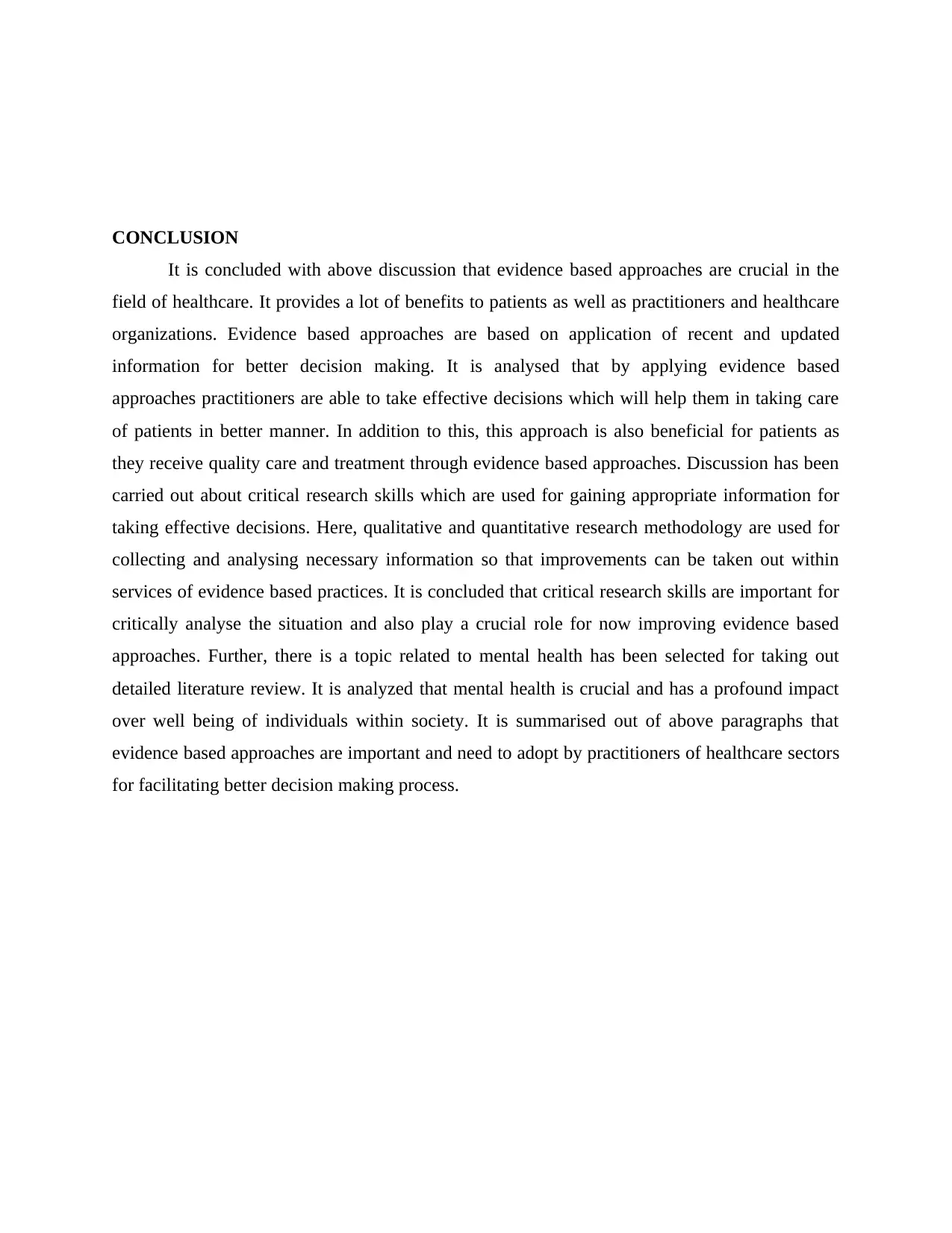
CONCLUSION
It is concluded with above discussion that evidence based approaches are crucial in the
field of healthcare. It provides a lot of benefits to patients as well as practitioners and healthcare
organizations. Evidence based approaches are based on application of recent and updated
information for better decision making. It is analysed that by applying evidence based
approaches practitioners are able to take effective decisions which will help them in taking care
of patients in better manner. In addition to this, this approach is also beneficial for patients as
they receive quality care and treatment through evidence based approaches. Discussion has been
carried out about critical research skills which are used for gaining appropriate information for
taking effective decisions. Here, qualitative and quantitative research methodology are used for
collecting and analysing necessary information so that improvements can be taken out within
services of evidence based practices. It is concluded that critical research skills are important for
critically analyse the situation and also play a crucial role for now improving evidence based
approaches. Further, there is a topic related to mental health has been selected for taking out
detailed literature review. It is analyzed that mental health is crucial and has a profound impact
over well being of individuals within society. It is summarised out of above paragraphs that
evidence based approaches are important and need to adopt by practitioners of healthcare sectors
for facilitating better decision making process.
It is concluded with above discussion that evidence based approaches are crucial in the
field of healthcare. It provides a lot of benefits to patients as well as practitioners and healthcare
organizations. Evidence based approaches are based on application of recent and updated
information for better decision making. It is analysed that by applying evidence based
approaches practitioners are able to take effective decisions which will help them in taking care
of patients in better manner. In addition to this, this approach is also beneficial for patients as
they receive quality care and treatment through evidence based approaches. Discussion has been
carried out about critical research skills which are used for gaining appropriate information for
taking effective decisions. Here, qualitative and quantitative research methodology are used for
collecting and analysing necessary information so that improvements can be taken out within
services of evidence based practices. It is concluded that critical research skills are important for
critically analyse the situation and also play a crucial role for now improving evidence based
approaches. Further, there is a topic related to mental health has been selected for taking out
detailed literature review. It is analyzed that mental health is crucial and has a profound impact
over well being of individuals within society. It is summarised out of above paragraphs that
evidence based approaches are important and need to adopt by practitioners of healthcare sectors
for facilitating better decision making process.
Paraphrase This Document
Need a fresh take? Get an instant paraphrase of this document with our AI Paraphraser
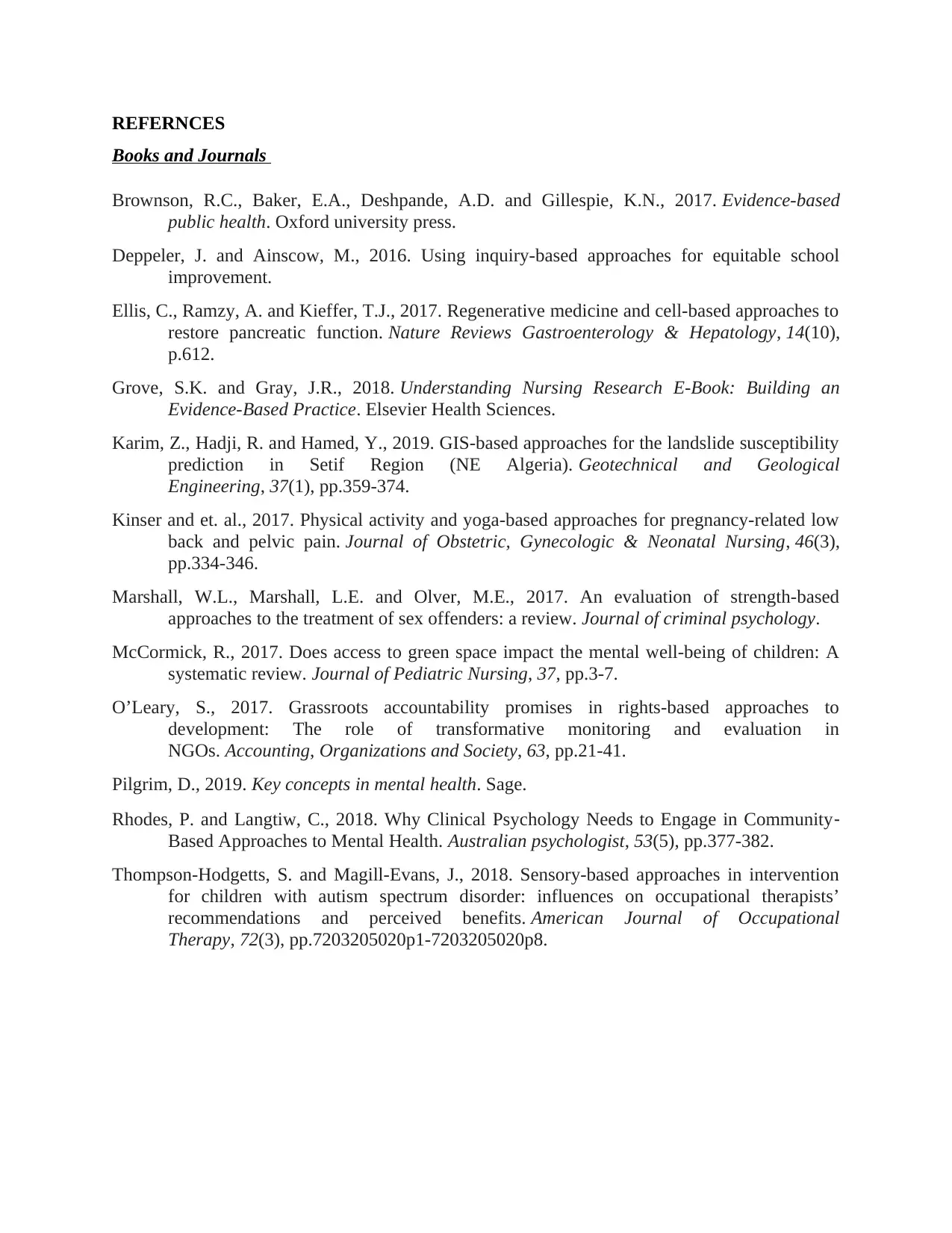
REFERNCES
Books and Journals
Brownson, R.C., Baker, E.A., Deshpande, A.D. and Gillespie, K.N., 2017. Evidence-based
public health. Oxford university press.
Deppeler, J. and Ainscow, M., 2016. Using inquiry-based approaches for equitable school
improvement.
Ellis, C., Ramzy, A. and Kieffer, T.J., 2017. Regenerative medicine and cell-based approaches to
restore pancreatic function. Nature Reviews Gastroenterology & Hepatology, 14(10),
p.612.
Grove, S.K. and Gray, J.R., 2018. Understanding Nursing Research E-Book: Building an
Evidence-Based Practice. Elsevier Health Sciences.
Karim, Z., Hadji, R. and Hamed, Y., 2019. GIS-based approaches for the landslide susceptibility
prediction in Setif Region (NE Algeria). Geotechnical and Geological
Engineering, 37(1), pp.359-374.
Kinser and et. al., 2017. Physical activity and yoga-based approaches for pregnancy-related low
back and pelvic pain. Journal of Obstetric, Gynecologic & Neonatal Nursing, 46(3),
pp.334-346.
Marshall, W.L., Marshall, L.E. and Olver, M.E., 2017. An evaluation of strength-based
approaches to the treatment of sex offenders: a review. Journal of criminal psychology.
McCormick, R., 2017. Does access to green space impact the mental well-being of children: A
systematic review. Journal of Pediatric Nursing, 37, pp.3-7.
O’Leary, S., 2017. Grassroots accountability promises in rights-based approaches to
development: The role of transformative monitoring and evaluation in
NGOs. Accounting, Organizations and Society, 63, pp.21-41.
Pilgrim, D., 2019. Key concepts in mental health. Sage.
Rhodes, P. and Langtiw, C., 2018. Why Clinical Psychology Needs to Engage in Community‐
Based Approaches to Mental Health. Australian psychologist, 53(5), pp.377-382.
Thompson-Hodgetts, S. and Magill-Evans, J., 2018. Sensory-based approaches in intervention
for children with autism spectrum disorder: influences on occupational therapists’
recommendations and perceived benefits. American Journal of Occupational
Therapy, 72(3), pp.7203205020p1-7203205020p8.
Books and Journals
Brownson, R.C., Baker, E.A., Deshpande, A.D. and Gillespie, K.N., 2017. Evidence-based
public health. Oxford university press.
Deppeler, J. and Ainscow, M., 2016. Using inquiry-based approaches for equitable school
improvement.
Ellis, C., Ramzy, A. and Kieffer, T.J., 2017. Regenerative medicine and cell-based approaches to
restore pancreatic function. Nature Reviews Gastroenterology & Hepatology, 14(10),
p.612.
Grove, S.K. and Gray, J.R., 2018. Understanding Nursing Research E-Book: Building an
Evidence-Based Practice. Elsevier Health Sciences.
Karim, Z., Hadji, R. and Hamed, Y., 2019. GIS-based approaches for the landslide susceptibility
prediction in Setif Region (NE Algeria). Geotechnical and Geological
Engineering, 37(1), pp.359-374.
Kinser and et. al., 2017. Physical activity and yoga-based approaches for pregnancy-related low
back and pelvic pain. Journal of Obstetric, Gynecologic & Neonatal Nursing, 46(3),
pp.334-346.
Marshall, W.L., Marshall, L.E. and Olver, M.E., 2017. An evaluation of strength-based
approaches to the treatment of sex offenders: a review. Journal of criminal psychology.
McCormick, R., 2017. Does access to green space impact the mental well-being of children: A
systematic review. Journal of Pediatric Nursing, 37, pp.3-7.
O’Leary, S., 2017. Grassroots accountability promises in rights-based approaches to
development: The role of transformative monitoring and evaluation in
NGOs. Accounting, Organizations and Society, 63, pp.21-41.
Pilgrim, D., 2019. Key concepts in mental health. Sage.
Rhodes, P. and Langtiw, C., 2018. Why Clinical Psychology Needs to Engage in Community‐
Based Approaches to Mental Health. Australian psychologist, 53(5), pp.377-382.
Thompson-Hodgetts, S. and Magill-Evans, J., 2018. Sensory-based approaches in intervention
for children with autism spectrum disorder: influences on occupational therapists’
recommendations and perceived benefits. American Journal of Occupational
Therapy, 72(3), pp.7203205020p1-7203205020p8.
1 out of 11
Related Documents
Your All-in-One AI-Powered Toolkit for Academic Success.
+13062052269
info@desklib.com
Available 24*7 on WhatsApp / Email
![[object Object]](/_next/static/media/star-bottom.7253800d.svg)
Unlock your academic potential
Copyright © 2020–2026 A2Z Services. All Rights Reserved. Developed and managed by ZUCOL.




